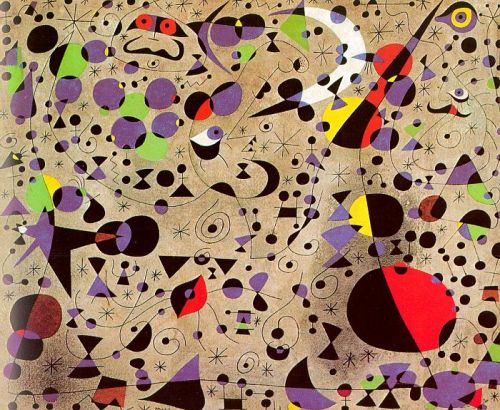what is poetry

“The Poetess“ (1940)
_____
when Aristotle “proceeds to declare the
parameters of “Poetry” for the ages“, his
definitions of the various poetic
“manner[s] or mode[s] of imitation”
have already been established, his
categorizations are not unlike Darwin’s
categorizations of the species during
a much later age, Aristotle was a natural
scientist much more than he was our
notion of an abstract philosopher, he
traded in facts rather than in the
esoteric musings that Plato, for
instance, pursued, Virtue, Justice,
the Good, his conclusions were more
verifiable
Kant, incidentally, is also famous for
following a similar form of investigation
as he attempted, nearly, for most,
inscrutably, to categorize the elements
of our faculty of understanding
a side story
Kant had stated that at birth we already
have within our perceptual framework
implicit understanding of space and
time, these are not learned through
experience but are already
incorporated within us, he said
many years ago, coming out of a
week-long coma, not knowing where
I was but alone, at that point even
just my consciousness, cause my
body, were it there, would’ve been
under the immaculate white sheets
I could see that would’ve been
shielding my legs
I looked around, could gather motes
upon rays of light that were entering
from what appeared to be a window
on the right, behind sheer white
curtains stirred by a soft breeze,
whirling the shimmering particles
alive in the light before me like
miniature spinning galaxies moving
at the pace of their own infinity
there was no sound
white walls around me stood utterly
still in the purview of my perception,
a door, also white, stood opposite
me on the opposite wall
where am I, I wondered, could this
be heaven, an afterlife, I might’ve
died, I thought, marvelling, no fear,
regret, nothing other than curiosity,
absorption, fascination
I tried to answer my question, where
am I, two dimensions, I figured
after having watched Terence Stamp
exiled by Marlon Brando to a flat
intergalactic window pane in
“Superman“, I hadn’t excluded this
eventuality, however ingloriously
transcendental, as a possible
outcome, I might be in a world with
only two dimensions, height and
width, no depth yet without more
investigation, experience
ergo, Kant, I concluded, was wrong,
our knowledge of space is not inborn
but a product of time and thought like
everything else
later, the white door on the far wall
opened, and a nurse walked in, also,
incidentally, in incandescent white,
and I understood I was alive
Aristotle suggested that our original
double instincts towards poetry were
our propensity to imitate, children
imitating their parents’ even
idiosyncratic mannerisms, for
instance
and rhythm, repetition, preludes to
order, coherence
those two
poetry, I read, is expression
reflecting the heartbeat, essentially,
in all its myriad representations
Richard